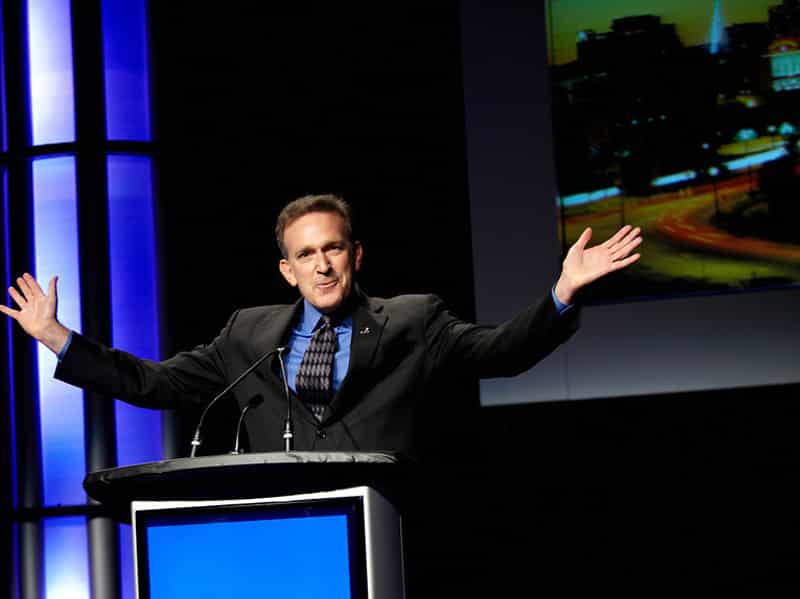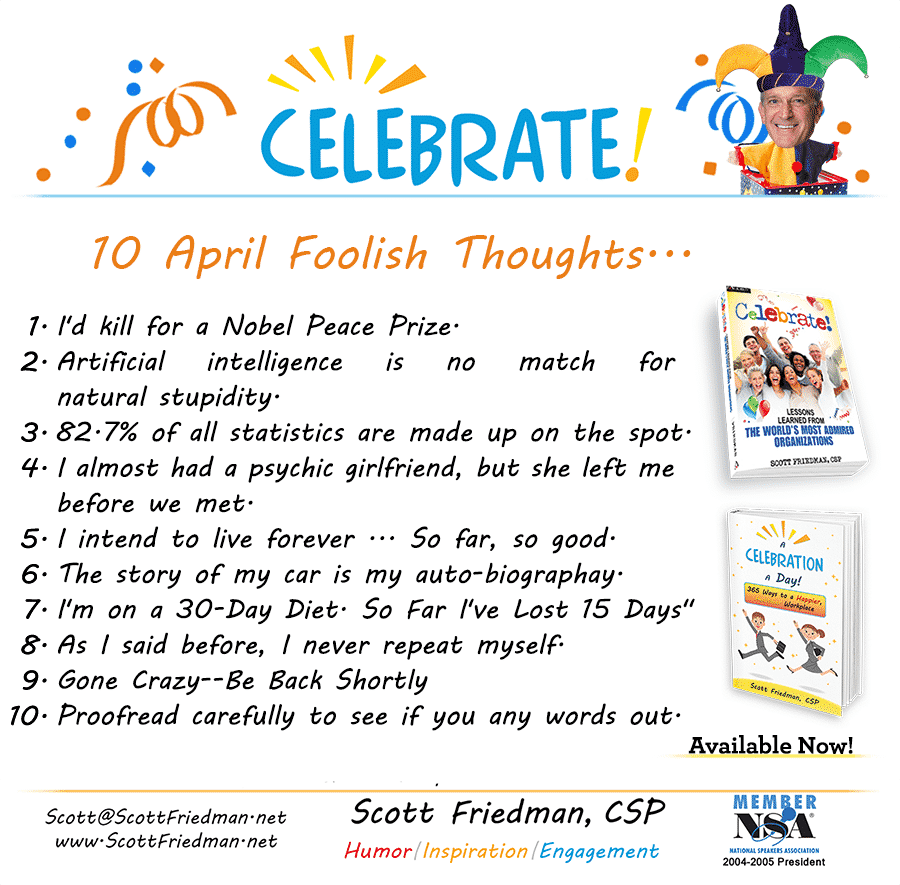Many of us would agree that being motivated is a key attribute to be a happy employee. A happy employee contributes to a productive organisation. A productive organisation portrays a positive brand to both its internal and external stakeholders and is a natural marketing magnet to attract good talents and potential customers.
However, despite knowing how important employee engagement is and its direct relation to a profitable business, some organisations still struggle to inspire their team. How can the notion of ‘celebrating’ be used as a tool to motivate your staff and make your brand stand out like a champion in the industry?
I caught up with Scott Friedman – The Motivational Humourist, the former President of the National Speakers Association (NSA) who is an internationally sought-after professional speaker and author of seven books. He’s spoken in over 25 countries, bringing humour, wisdom, and a “Celebration Mindset” to over 2000 organisations and showed how it can improve an organisation’s performance.
Scott, it’s been more than a decade since we last met. It’s great to be able to connect with you again and thank you for being on MIA. Let’s start by telling our readers who Scott Friedman is, and how you got into this business of being the motivational humourist.
It all started in 1985 when I was working for a printing company in sales and marketing. At the same time I was President of a Sales Networking Association, called Sales Professionals. Every Tuesday, we’d have a Motivational Speaker. One Tuesday we had the founder of the National Speakers Association, Cavett Robert speak. Cavett told me I had a unique style and would make a great professional speaker. At the time I didn’t realise he said that to everyone. And I’m glad I didn’t because I quit the printing business and went to work for a professional speaking company and within a year, I set out on a speaking career.
Quickly, I learned that if I wanted people to pay attention to my talk, it had to be funny. If I wanted to be asked to speak again, I’d better use humour. And most importantly, I better use humour if I wanted to get paid. I found that the more they laughed, the more attention they paid; the more attention they paid, the more they learned and laughed; the more they learned and laughed, the more money they paid. Because I was using so much humour in my talks, the market defined me as a motivational humourist. So, today I’m really a motivational employee engagement/customer experience expert who uses humour as the way to get my message across. I recommend to everyone telling their stories live or through social media to use a little humour.

Scott, let’s talk about this serious business of ‘celebration’ and ‘humour’ at the workplace and its relation to performance. You are probably aware that in Asia, we live in a culture that is known to be a little more serious and refined. How does introducing the concept of ‘celebration’ and ‘humour’ help bring positive outcomes to organisations?
The reason people leave organisations is because they don’t get along with their boss or they feel under appreciated. Many feel that they don’t have a voice. Over time, they become withdrawn and disengaged. This greatly impacts productivity. Gallup estimates that 500 billion dollars a year is lost in productivity due to dis-engaged workers. That is in the US alone. It is a huge problem in Asia as well.
According to a Hay Study, companies with engaged employees outperform those with dis-engaged employees, 54% in employee retention, 78% in customer satisfaction, and 400% in revenue growth. One common denominator that keeps leaders around the world up at night is figuring out how better to engage their employees. It is this engagement that will lead to greater productivity and elevated team performance. Humour and Celebration while they may not seem to fit into a workplace in Asia, if done right, it is the perfect way to engage staff which will lead to much greater outcomes. Humour and celebration are really more about cultivating the right attitude and honouring your employees in a way that they feel respected and appreciated. This is the key to engagement leading to positive outcomes.
You lead a unique programme called ‘‘Sell-e-brate’ Winning the Hearts and Business of Tomorrow’s Customers”, which targets the sales team. Tell us more about this programme and an example of an Asian brand you have worked with on a successful implementation.
“Sell-e-brate” is a reminder that you’re not really there to sell to your customers, but to celebrate your customers. The key to winning the hearts of your clients is to learn as much as you can about them and their situation so you can more effectively solve their problem and create good feelings. The more you know about your client the easier it is to delight them. The key is becoming an advisor or consultant for clients and becoming their go-to source for solutions. It starts with creating connections through active listening, creativity and humour. Once engaged and connected we can create the “WoW”.
After doing a program for the Royal Plaza on Scotts in Singapore, the Sales Director told me how sending cartoons embedded in his emails had led to better relationships which ultimately led to increased sales. Humour and Celebration can build better relationships which build trust. Trust uncovers hidden objections which reveal potential solutions and long-term loyal clients.
Scott, we all know how much Covid-19 has created havoc for many businesses. Emotions run high, people are worried about their jobs, and business owners are grappling with survival. Tell us which type of companies do well when faced with a drastic economic catastrophe or downturn? What strategies did they put in place to withstand the hard times, and came out even better than before?
What I’ve noticed during times of crisis is the companies that survive and thrive are the ones that take care of their employees and over-communicate. Employees are scared and turn to their leaders for safety and guidance. Instead of an autocratic, top down approach, where leaders make decisions without input or concern for employees, now is the time to be open, honest, and totally transparent.
I’d recommend town hall meetings whereby employees have a chance to share their feelings and raise their concerns and questions. By communicating the stark reality of what is happening and asking for input, leaders gain the trust from their people. Creating a “we” approach gives employees assurance that they have a voice, and are important to the organisation. It’s imperative for leaders to actively listen and communicate every step of the way and keep their employees’ well-being in mind.
If there are lay-offs, take the most human approach possible, give staff resources and channels to make the transition as painless as possible. This will gain you respect and keep your brand positive in the eyes of employees and the outside world.
From a customer standpoint, this is not the time to sell but to show you care. Reach out to customers to make sure they are safe and let them know you’re available to help. It’s a good time to surprise them with pizza delivery, a care package or a heartfelt note. This will go a long way in building a long term relationship.
OK, before you go, tell us about the inspirations behind your wonderful marketing tactic of sending all these humour cards to your clients. I remembered receiving them on special celebrations such as Halloween, New Year, and April Fool’s Day. From your experience, how can such tactics be applied in businesses, either as an employer or a business owner?
The cards have been part of my marketing strategy for three decades now. The impetus behind them is all about building better relationships. We are all faced with the same dilemma of a finite amount of time every day. How best can we maximise that time between work and family commitments, and making sure to keep all of our relationships healthy.
I learned in my early days to be successful in business, we must truly connect with our employees and customers. I find that by sharing clever cards and writing a personal note at least once a year to each client or friend, I maintain that connection. It takes me nearly a month to write on all 2000+ cards and it always leads to many gratifying emails, calls and a few bookings. It’s not about the quantity but the quality of our contact. Showing you truly care is what will bring you long term success.

(Images: Courtesy of Scott Friedman)
What can we expect out of Scott Friedman in the next couple of years?
In 2008, Jana Stanfield and I founded Together We Can Change the World, an NGO focused on the education, empowerment and well-being of girls and women in SE Asia. We now have close to 20 causes that we support in 5 SE Asian Countries. I now spend 100+ days in SE Asia between speaking and the Foundation.
In the coming years, I look to raise more money for the causes we support and continue to match the business community with the causes we serve with the goal of creating sustainability for those causes.
Two speaker tours a year help fund our causes and introduce speakers to the business community and a chance to serve our causes. The tours also introduce the business community to both our speakers and our causes.
We are currently in the process of creating a learning platform for our speakers’ products and advancing the reach of our Speakers Bureau. This will allow us to introduce more professional speakers to the Asian market where they can speak and serve.
I am also working on my third book in the Celebrate series, which will focus on organisations and individuals that are creatively inspiring employee engagement and innovation in the world today.
What is the best way for people to connect with you, Scott?
Connect with me on these platforms: LinkedIn, website, Twitter, Facebook and Facebook Group.
Kartina is Marketing In Asia's Editor for Op-Ed. She is also the Founder of Tin Communications. A media specialist with over 20 years of experience in both public and private sectors, she helps SMEs grow their business through strategic media and marketing plans. Connect with her on LinkedIn. You may also reach her by email at kartina@localhost.















